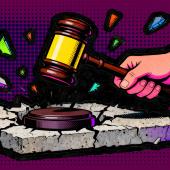We are their voice, professionally and morally, but in litigation, we are also an extension of their egos and aspirations.
In-house counsel talk a lot about “adding value” and serving as “business partners.” We pride ourselves on giving legal advice that reflects commercial realities and legislative unknowns.
And, of course, we do all of this with a firm basis in our ethical obligations: to our clients, to the legal system, and to society at large.
For all this talk, however, most of our clients don’t seem to notice. They plod along in their daily routine, go about their business, and hope that we don’t cause them too many complications.
That is, they don’t notice until the summons or subpoena arrives on their desk. Or when a state or federal investigator comes by for a friendly chat. Then, suddenly, we are their nearest, dearest friend.
For most of us, litigation is normal — often mere drudgery but sometimes a bit exciting — and just part of the job. For our clients, however, litigation is a life event, one they speak about with both awe and despair.
It is when our clients are most worried, most confused, and in the greatest need of a calm, rational voice that can help guide them through stressful times. And they are often mistaken about what corporate litigation really entails.
For our clients, litigation is a zero-sum game: one winner and one loser. We know it rarely ends up that way.
Our clients see the judiciary as a realm of experts: sage, seasoned, and wise. We know that judges are just like us, doing a tough job with flourishes of brilliance.
When our clients think of litigation, they think of courtroom theater and pithy cross-examination. We know that the best maneuvers often take place in the written pre-trial or appellate briefs.
And in the throes of battle, our clients expect their lawyers to excel. We are their voice, professionally and morally, but in litigation, we are also an extension of their egos and aspirations. Even if we are mere observers in the courtroom, our clients see us as their ally and their expert.
Litigation is our moment to shine. This month’s issue of the ACC Docket focuses on this critical opportunity.
Over the following pages, your fellow in-house practitioners offer you their latest thinking on key litigation topics and, more importantly, what to do in advance of litigation to reduce your client’s risk.
There’s advice on whistleblowing and internal investigations as well as OSHA inquiries, cybercrime, and a list of 10 steps to keep your company out of court. For the patent practitioner, a retrospective review of inter partes actions will strike a chord. And if a lawsuit is inevitable, you will appreciate the insights on litigation funding, an attractive way to transform your department into a source of income for the company.
In short, this copy of the ACC Docket gives you even more of what you need to be the best in-house lawyer you can be, for that time when your clients will take appreciative notice.




